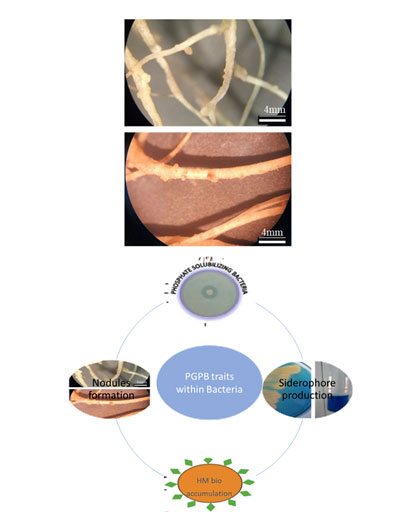
Molecular Analysis of Microbial Resistance to Multiple Environmental Pollutants
Nationally
The reuse of Treated Wastewater (TWW) as an alternative water resource in demanding sectors such as agriculture irrigation is an expendable practice especially in areas with a lack of water, such as arid and semi-arid regions. Tunisia has been trying to reuse treated waste water (TWW) for irrigation since the 80ŌĆÖs to satisfy its agricultural needs. Though this kind of waters meets the standards of discharge into the environment, the overtime cumulative effect and the persistence of different non-biodegradable compounds makes it a debatable matter. Impacts of long-time TWW irrigation are surfacing worldwide implicating over time soil degradation, decrease in fertility or the transfer of contaminants to the cultivated plant. Therefore, alternative methods to use TWW in an environmentally safe way, decreasing the impact of its contaminants on the soil and especially on plant growth are being developed.
Agricultural production is declining mainly because of climate change, less attractive farming professions, but also because of environmental pollution. For many years, Tunisia has neglected its agricultural sector for the benefit of tourism and industry. The food balance deficit rose from 0.6 billion DT in 2009 to 1.3 billion DT at the end of October 2019 and continues to worsen in 2021 with the unprecedented health crisis due to COVID 19 and in the years to come. Thus, at least 30% of agricultural production in Tunisia is destroyed, according to the Tunisian Union of Agriculture and Fisheries (UTAP).
International
Over the past few decades, the degradation of exploited land has become rapid and massive throughout the world. Degraded soils are in such a state of health that they are no longer able to provide the usual goods and services to the ecosystem. There are many symptoms of soil degradation. These include, among other things, the decline in soil fertility, the development of acidity, salinization, alkalization, the deterioration of soil structure, the acceleration of water and wind erosion, the loss of organic matter and biodiversity. Soil degradation is determined by the two major soil pressures that are (i) physical pressures related to loss of mass and structure and (ii) pressures on the long-term bioavailability of nutrients. It leads to a decline in agricultural productivity and incomes, with increased rural poverty and the migration of rural populations to urban areas.
Thus, the need to support agriculture has actually increased in recent years. Fortunately, microorganisms adapted to telluric stresses and plantsŌĆÖ rhizosphere can have a beneficial effect on plant culture and yield; theyŌĆÖre called PGPBs (Plant Promoting Growth Bacteria). Based on their patterns of action, PGPBs are classified into four groups: bio-fertilizers that increase the availability of nutrients for the plant; phyto-stimulants that produce phytohormones; rhizo-remediators that degrade organic pollutants; and bio-pesticides that control diseases through the production of fungicidal metabolites and antibiotics. Among the PGPBs, many genera are identified such as Azotobacter, Azospirillum, Bacillus, Burkholderia, Enterobactter, Pseudomonas, Rhizobium, Serratia and Bacillus. In addition, the application of TWW to soils has enhanced the transfer of micro-pollutants resistance and degradation genes among soil microbial communities, which has enabled some of these populations to modify their activity spectrum to adapt, tolerate, and even resist these contaminants, thus altering the biodiversity and composition of microbial populations in in the rhizosphere of irrigated plants.
Goals
In order to fill the water resource deficits in Tunisia, the reuse of TWW appears to be an interesting alternative to fresh water. Although they are rich in nutrients for soil microorganisms and fertilizers, they also represent a danger because they carry diverse molecules harmful to human, animal and environmental health. Our research is focusing on the contaminants present in these TWW such as heavy metals, antibiotics, hydrocarbons and microplastics. Microorganisms with tolerance/degradation/biosorption traits towards these contaminants are isolated from these TWW or TWW irrigated soils and characterized to assess their potential to relieve stress caused by these contaminants on plants via plant-microorganism interactions. Thus, our goal is to define a multi-pollutant-resistant bacterial consortium and able to promote abiotically stressed plants.
Program and Methodology
- Isolation and characterization of multi-resistant (heavy metal, antibiotic, HAPŌĆ” resistant) bacterial strains, using 16S approach and whole genome sequencing.
- Biosorption/degradation/resistance traits testing of different pollutants through cultivation methods, pollutant degradability tests (HPLC) and metal biosorption (atomic absorption spectrometry, ICP).
- Defining an ŌĆśidealŌĆÖ bacterial consortium to alleviate stress caused by these contaminants on plantsŌĆÖ growth and yield by growing plants in the presence of the contaminants and the bacteria consortiums. The use of biochemical dosages, protein studies and resistance genes (PCR) will allow the study of plant-bacterial interaction.
- Resistant bacteria (RB) and resistance genes (RG) dissemination study and correlation analysis between the discharge of effluents from WWTP and the environmental dispersion of these RBs and RGs using HT- qPCR technique, biostatistics software and backages.
Socio-Economic Benefits
- Report on impacts of TWW on soils (spread of antibiotic residues, heavy metal resistant bacteria and their resistance genes).
- Information to stakeholders on the risks of wastewater reuse
- Application of natural bio-stimulants for stressed plant growth improvement to reduce the use of excessively expensive and polluting fertilizers.
- Development of biotechnological tools for TWW depollution (using bioremediation)
Team members
|
Coordinator: Chouari Rakia
|
Associate professor
|
|
Chouari Rakia
Djebali Wahbi
Dris-Limam Rym
Thabti Fatma
Hammami-Nehdi Samia
Tenani Mehdi
|
Associate Professor
Professor
Assistant Professor
Assistant Professor
Assistant Professor
Assistant Professor
|
|
Chamekh Anissa
Yaakoubi Amira
Khayar Mohamed Amine
Asmi Sahar
|
Post-Doc
Ph.D. student
Master's intern
Master's intern
|
 facult├® des sciences de bizerte
Ensemble pour une facult├® meilleur
facult├® des sciences de bizerte
Ensemble pour une facult├® meilleur
 facult├® des sciences de bizerte
Ensemble pour une facult├® meilleur
facult├® des sciences de bizerte
Ensemble pour une facult├® meilleur